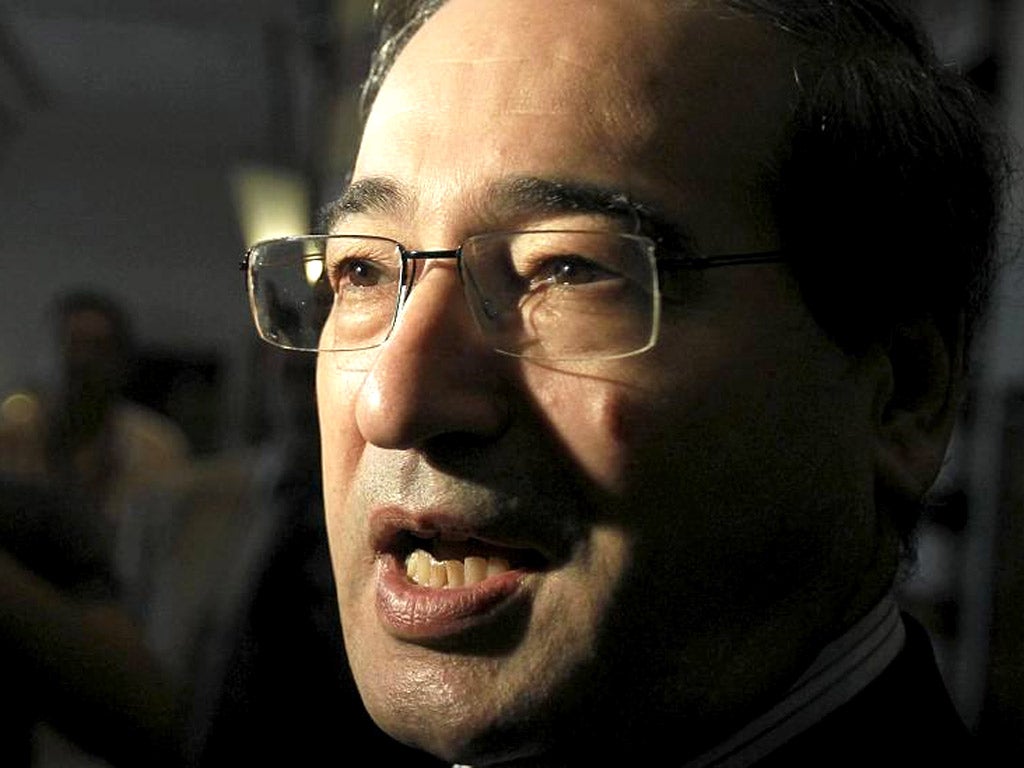The mystery of Syria's missing spokesman: 'He hasn't disappeared. He's just on three months' leave'
Syria has been gripped by the mystery of the missing foreign ministry spokesman. So what's the truth?

Your support helps us to tell the story
From reproductive rights to climate change to Big Tech, The Independent is on the ground when the story is developing. Whether it's investigating the financials of Elon Musk's pro-Trump PAC or producing our latest documentary, 'The A Word', which shines a light on the American women fighting for reproductive rights, we know how important it is to parse out the facts from the messaging.
At such a critical moment in US history, we need reporters on the ground. Your donation allows us to keep sending journalists to speak to both sides of the story.
The Independent is trusted by Americans across the entire political spectrum. And unlike many other quality news outlets, we choose not to lock Americans out of our reporting and analysis with paywalls. We believe quality journalism should be available to everyone, paid for by those who can afford it.
Your support makes all the difference.Senior Syrian government officials said today that the recognition of the opposition coalition as the legitimate government by the US and many other countries would not change the situation on the ground.
The Deputy Foreign Minister, Faisal al-Miqdad, said in an interview with The Independent that foreign countries were “recognising an artificial structure, a structure that will help promote the objectives of the US and European countries in Syria”. He denied that the opposition represented real political forces inside Syria.
Mr Miqdad’s assertion that the opposition coalition had been created by the US and was unrepresentative was echoed in a separate interview by the Syrian Information Minister Omran al-Zoebi. In a striking parallel, he said that the US move was rather as if Syria “had recognised Liverpool Football Club as the sole representative of the British people while in fact it represented very little”.
The Syrian government is defiant as it faces growing international isolation, saying that whatever happens it was not going to lose militarily on the ground having withstood heavy pressure from inside and outside the country for almost two years. “I assure you this [move by the US] will not add anything,” said Mr Miqdad. “It is mere propaganda and psychological warfare directed against the Syrians and the Syrian government and is aimed at encouraging those armed groups that have been unable to achieve any real progress in Syria.”
This seemed a bit rich since Damascus had been echoing to the sound of distant gunfire all morning, suggesting that the armed groups had not been wholly ineffectual. But Mr Miqdad responded that in any case armed actions did not give those who carried them out legitimacy and just meant there were terrorist groups “which should have been fought against by Europe and the United States”.
This is a point repeatedly made by Syrian officials asking how come the US and Britain are against terrorists in one country, but favours them in another. What does the Syrian government think of the condemning of the powerful fundamentalist group, the Jabhat al-Nusra, as terrorists. “It is too late, too small,” said Mr Miqdad. “We believe they should have condemned all those who are carrying arms against a legitimate government. They should tell their friends to refrain from supporting terrorism in Syria.”
Why are the US and its allies so keen on getting rid of the Syrian administration? Mr Miqdad thought that there was hostility to Syria because of its support for the Palestinians against Israel and its long- term alliance with Iran.
He had a particular attitude towards the uprisings of the so-called Arab Spring which he said were similar to coups d’etat. Challenged on this, he said that, while Syria respected what other countries did, “if the Egyptian army had not changed sides there would not have been that change. But we want that change to come normally and not from outside.” By far the most important ally remaining to Syria is Russia and Mr Miqdad said they “have daily conversations” with their Russian counterparts.
There was one more intriguing question. What happened to Jihad Makdissi, the foreign ministry spokesman, who was reported earlier this month to have left Damascus? Had he been fired or had he defected? Where had he disappeared to?
“He did not disappear. He is on release for three months and he’s enjoying his time, I hope.” Was he still spokesman for the foreign ministry? “For this moment, until now, he is still spokesman,” said Mr Miqdad. “We did not take any other decision.” And where is he? “It is said he is in Beirut.”
Finally and most important, how does Syria and the Syrian government get out of its present crisis? Mr Miqdad spoke of constitutional reforms already introduced, a multiparty system, the end of the leading role of the Baath party, and, if that did not work, national dialogue. The UN was having talks with some of the armed opposition.
But the booming of guns in the distance somehow suggested that events had moved beyond negotiation and compromise and the future of Syria would be decided on the battlefield.
Join our commenting forum
Join thought-provoking conversations, follow other Independent readers and see their replies
Comments